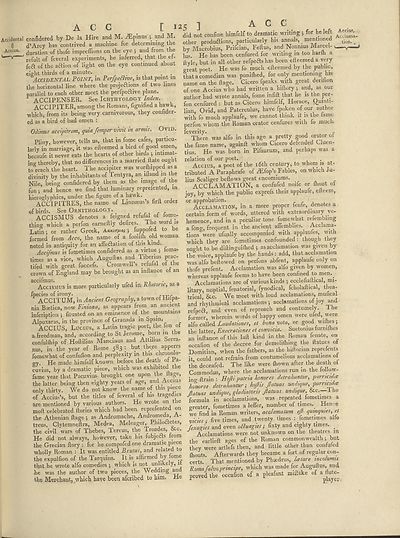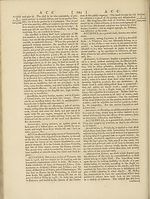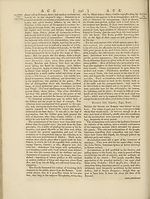Encyclopaedia Britannica, or, a Dictionary of arts, sciences, and miscellaneous literature : enlarged and improved. Illustrated with nearly six hundred engravings > Volume 1, A-AME
(143) Page 125
Download files
Complete book:
Individual page:
Thumbnail gallery: Grid view | List view

Aceius.
ACC [i
Accidental confidered by De la Hire and M. ^Epinus 5 and M.
" d’Arcy has contrived a machine for determining the
duration of thofe impreffions on the eye ; and from the
refult of feveral experiments, he inferred, that the ef-
feft of the aaion of light on the eye continued about
eight thirds of a minute. , . .
Accidental Point, in PerfpeBive, is that point m
the horizontal line where the projeaions of two lines
parallel to each other meet the perfpeaive plane.
r ACCIPENSER. See Ichthyology Index.
ACCIPITER, among the Romans, fignified a hawk,
which, from its being very carnivorous, they confider¬
ed as a bird of bad omen :
Oditnus accipitrem, quia fetnper vivit m armis. Ovid.
Pliny, however, tells us, that in fome cafes, particu¬
larly in marriage, it was efteemed a bird of good omen,
becaufe it never eats the hearts of other birds ; intimat¬
ing thereby, that no differences in a married ftate ought
to reach the heart. The accipiter was worHupped as a
divinity by the inhabitants of Tentyra, an illand in the
Nile being confidered by them as the image ol the
fun j’and hence we find that luminary reprefented, in
hieroglyphics, under the figure of a hawk.
ACCIPITRES, the name of Linnaeus’s firit order
of birds. See Ornithology. ^ rri ,,
ACCISMUS denotes a feigned refutal of iome-
thing which a perfon earneftly defires. The word is
Latin: or rather Greek, ? fuppofed to be
formed from Acco, the name of a foolifti old woman
noted in antiquity for an affe£fation of this kind.
Accifmus is fometimes confidered as a virtue 5 lorn®!-
times as a vice, which Auguftus and Oberms prac-
tifed with great fuccefs. Cromwells refufal of the
crown of England may be brought as an inftance of an
accifmus. .
Accismus is more particularly ufed in Khetonc, as a
fpecies of irony. nuT
ACCITUM, in Ancient Geography, a town of Liilpa-
nia Bsetica, now Flniana, as appears from an ancient
infeription ; fituated on an eminence of the mountains
Alpuxaras, in the province of Granada in Spain.
ACCIUS, Lucius, a Latin tragic poet, the ion of
a freedman, and, according to St Jerome, born in the
confullhip of Hoftilius Mancinus and Attilms Serra-
nus, in the year of Rome 583: but there apperrs
fomewhat of confufion and perplexity in this chronolo¬
gy. He made himfelf known before the death of ra-
cuvius, by a dramatic piece, which was exhibited the
fame year that Pacuvius brought one upon the it age,
the latter being then eighty years of age, and Accms
only thirty. We do not know the name of this piece
of Acciub’s, but the titles of feveral of his tragedies
are mentioned by various authors. He wrote on the
moft celebrated ftories which had been reprelented on
the Athenian ftage j as Andromache, Andromeda, A-
treus, Clytemneftra, Medea, Meleager, PEilodetes,
the civil wars of Thebes, Tereus, the Troades, &c.
He did not always, however, take his fubjetls from
the Grecian ftory : for he compofed one dramatic piece
wholly Roman : It was entitled Brutus, and related to
the expulfion of the Tarquins. It is affirmed by iome
that he wrote alfo comedies $ which is not unlikely, it
he was the author of two pieces, the Wedding and
the Merchant, which have been aferibed to him. He
25 ] ACC
did not confine himfelf to dramatic writing J for he left
other produdions, particularly his annals, _ mentioned tion> ^
by Macrobius, Prifcian, Feftus, and Nonmus Marcel- t—-y- 1
lus. He has been cenfured for writing in too harfii a
ftyle, but in all other refpeashas been eiteemed a very
great poet. He was fo much efteemed by the public,
that a comedian was puniftied, for only mentioning his
name on the ftage. Cicero fpeaks with great denfion
of one Accius who had written a hiftory ; and, as our
author had wrote annals, fome infill that he is the per¬
fon cenfured : but as Cicero himfelf, Horace, Ouinti-
lian, Ovid, and Paterculus, have fpoken of our author
with fo much applaufe, we cannot think it is the fame
perfon whom the Roman orator cenfures with io much,
feverity. c
There was alfo in this age a pretty good orator of
the fame name, againft whom Cicero defended Cluen-
tius. He was born in Pifaurum, and perhaps was a
relation of our poet.
Accius, a poet of the 16th century, to whom is at¬
tributed A Paraphrafe of iEfop’s.Fables, on which Ju¬
lius Scaliger beftows great encomiums.
ACCLAMATION, a confufed noife or fhout of
joy, by which the public exprefs their applaufe, efteem,
or approbation.
Acclamation, in a more proper fenle, denotes a
certain form of words, uttered with extraordinary ve¬
hemence, and in a peculiar tone fomewhat refembhng
a fong, frequent in the ancient affemblies. Acclama¬
tions were ufually accompanied with applaules with
which they are fometimes confounded : though they
ought to be diftinguiffied j as acclamation was given by
the voice, applaufe by the hands : add, that acclamation
was alfo bellowed on perfons abfent, applaufe only on
thofe prefent. Acclamation was alfo given by women,
whereas applaufe feems to have been confined to men..
Acclamations are of various kinds *, ecclefiaftical, mi¬
litary, nuptial, fenatorial, fynodical, fcholaftical, thea¬
trical, &c. We meet with loud acclamations, muiical
and rhythmical acclamations j acclamations of joy and
refnea, and even of reproach and contumely. 1 he
former, wherein words of happy omen were uled, were
alfo called Laudationes, et bona vota, or good wilhesj
the latter, Execrationes et convicia. Suetonius iurmihes
an inftance of this laft kind in the Roman fenate, on
occafion of the decree for demoliffiing the ftatues oi
Domitian, when the fathers, as the hiftorian reprefents
it could not refrain from contumelious acclamations ot
the deceafed. The like were ffiown after the death ol
Commodus, where the acclamations run in the tollow-
ing ftrain : Hojli patria honores detrahantur, parricide*
honores detrahantur; hojlis Jlatuas undjque, parncidce
Jlatuas undique, gladiatoris Jlatuas undique, etc.. 1 he
formula in acclamations, was repeated, lometimes a
greater, fometimes a leffer, number of times. Hence
we find in Roman writers, accJamalum ejl qumqmes,et
vicies ; five times, and twenty times : fometimes alio
fexagies and even oBuagies; fixty and eighty times. .
Acclamations were not unknown on the theatres in
the earlieft ages of the Roman commonwealth ; but
they were artlefs then, and little other than confufed
(bouts. Afterwards they became a fort of regular con¬
certs. That mentioned by Phaedrus, lectare incolumis
Roma falvoprincipe, which was made for Auguftus and
proved the occafion of a pleafant miftake of a^flute-
ACC [i
Accidental confidered by De la Hire and M. ^Epinus 5 and M.
" d’Arcy has contrived a machine for determining the
duration of thofe impreffions on the eye ; and from the
refult of feveral experiments, he inferred, that the ef-
feft of the aaion of light on the eye continued about
eight thirds of a minute. , . .
Accidental Point, in PerfpeBive, is that point m
the horizontal line where the projeaions of two lines
parallel to each other meet the perfpeaive plane.
r ACCIPENSER. See Ichthyology Index.
ACCIPITER, among the Romans, fignified a hawk,
which, from its being very carnivorous, they confider¬
ed as a bird of bad omen :
Oditnus accipitrem, quia fetnper vivit m armis. Ovid.
Pliny, however, tells us, that in fome cafes, particu¬
larly in marriage, it was efteemed a bird of good omen,
becaufe it never eats the hearts of other birds ; intimat¬
ing thereby, that no differences in a married ftate ought
to reach the heart. The accipiter was worHupped as a
divinity by the inhabitants of Tentyra, an illand in the
Nile being confidered by them as the image ol the
fun j’and hence we find that luminary reprefented, in
hieroglyphics, under the figure of a hawk.
ACCIPITRES, the name of Linnaeus’s firit order
of birds. See Ornithology. ^ rri ,,
ACCISMUS denotes a feigned refutal of iome-
thing which a perfon earneftly defires. The word is
Latin: or rather Greek, ? fuppofed to be
formed from Acco, the name of a foolifti old woman
noted in antiquity for an affe£fation of this kind.
Accifmus is fometimes confidered as a virtue 5 lorn®!-
times as a vice, which Auguftus and Oberms prac-
tifed with great fuccefs. Cromwells refufal of the
crown of England may be brought as an inftance of an
accifmus. .
Accismus is more particularly ufed in Khetonc, as a
fpecies of irony. nuT
ACCITUM, in Ancient Geography, a town of Liilpa-
nia Bsetica, now Flniana, as appears from an ancient
infeription ; fituated on an eminence of the mountains
Alpuxaras, in the province of Granada in Spain.
ACCIUS, Lucius, a Latin tragic poet, the ion of
a freedman, and, according to St Jerome, born in the
confullhip of Hoftilius Mancinus and Attilms Serra-
nus, in the year of Rome 583: but there apperrs
fomewhat of confufion and perplexity in this chronolo¬
gy. He made himfelf known before the death of ra-
cuvius, by a dramatic piece, which was exhibited the
fame year that Pacuvius brought one upon the it age,
the latter being then eighty years of age, and Accms
only thirty. We do not know the name of this piece
of Acciub’s, but the titles of feveral of his tragedies
are mentioned by various authors. He wrote on the
moft celebrated ftories which had been reprelented on
the Athenian ftage j as Andromache, Andromeda, A-
treus, Clytemneftra, Medea, Meleager, PEilodetes,
the civil wars of Thebes, Tereus, the Troades, &c.
He did not always, however, take his fubjetls from
the Grecian ftory : for he compofed one dramatic piece
wholly Roman : It was entitled Brutus, and related to
the expulfion of the Tarquins. It is affirmed by iome
that he wrote alfo comedies $ which is not unlikely, it
he was the author of two pieces, the Wedding and
the Merchant, which have been aferibed to him. He
25 ] ACC
did not confine himfelf to dramatic writing J for he left
other produdions, particularly his annals, _ mentioned tion> ^
by Macrobius, Prifcian, Feftus, and Nonmus Marcel- t—-y- 1
lus. He has been cenfured for writing in too harfii a
ftyle, but in all other refpeashas been eiteemed a very
great poet. He was fo much efteemed by the public,
that a comedian was puniftied, for only mentioning his
name on the ftage. Cicero fpeaks with great denfion
of one Accius who had written a hiftory ; and, as our
author had wrote annals, fome infill that he is the per¬
fon cenfured : but as Cicero himfelf, Horace, Ouinti-
lian, Ovid, and Paterculus, have fpoken of our author
with fo much applaufe, we cannot think it is the fame
perfon whom the Roman orator cenfures with io much,
feverity. c
There was alfo in this age a pretty good orator of
the fame name, againft whom Cicero defended Cluen-
tius. He was born in Pifaurum, and perhaps was a
relation of our poet.
Accius, a poet of the 16th century, to whom is at¬
tributed A Paraphrafe of iEfop’s.Fables, on which Ju¬
lius Scaliger beftows great encomiums.
ACCLAMATION, a confufed noife or fhout of
joy, by which the public exprefs their applaufe, efteem,
or approbation.
Acclamation, in a more proper fenle, denotes a
certain form of words, uttered with extraordinary ve¬
hemence, and in a peculiar tone fomewhat refembhng
a fong, frequent in the ancient affemblies. Acclama¬
tions were ufually accompanied with applaules with
which they are fometimes confounded : though they
ought to be diftinguiffied j as acclamation was given by
the voice, applaufe by the hands : add, that acclamation
was alfo bellowed on perfons abfent, applaufe only on
thofe prefent. Acclamation was alfo given by women,
whereas applaufe feems to have been confined to men..
Acclamations are of various kinds *, ecclefiaftical, mi¬
litary, nuptial, fenatorial, fynodical, fcholaftical, thea¬
trical, &c. We meet with loud acclamations, muiical
and rhythmical acclamations j acclamations of joy and
refnea, and even of reproach and contumely. 1 he
former, wherein words of happy omen were uled, were
alfo called Laudationes, et bona vota, or good wilhesj
the latter, Execrationes et convicia. Suetonius iurmihes
an inftance of this laft kind in the Roman fenate, on
occafion of the decree for demoliffiing the ftatues oi
Domitian, when the fathers, as the hiftorian reprefents
it could not refrain from contumelious acclamations ot
the deceafed. The like were ffiown after the death ol
Commodus, where the acclamations run in the tollow-
ing ftrain : Hojli patria honores detrahantur, parricide*
honores detrahantur; hojlis Jlatuas undjque, parncidce
Jlatuas undique, gladiatoris Jlatuas undique, etc.. 1 he
formula in acclamations, was repeated, lometimes a
greater, fometimes a leffer, number of times. Hence
we find in Roman writers, accJamalum ejl qumqmes,et
vicies ; five times, and twenty times : fometimes alio
fexagies and even oBuagies; fixty and eighty times. .
Acclamations were not unknown on the theatres in
the earlieft ages of the Roman commonwealth ; but
they were artlefs then, and little other than confufed
(bouts. Afterwards they became a fort of regular con¬
certs. That mentioned by Phaedrus, lectare incolumis
Roma falvoprincipe, which was made for Auguftus and
proved the occafion of a pleafant miftake of a^flute-
Set display mode to:
![]() Universal Viewer |
Universal Viewer | ![]() Mirador |
Large image | Transcription
Mirador |
Large image | Transcription
Images and transcriptions on this page, including medium image downloads, may be used under the Creative Commons Attribution 4.0 International Licence unless otherwise stated. ![]()
| Permanent URL | https://digital.nls.uk/193133844 |
|---|
| Attribution and copyright: |
|
|---|
| Description | Ten editions of 'Encyclopaedia Britannica', issued from 1768-1903, in 231 volumes. Originally issued in 100 weekly parts (3 volumes) between 1768 and 1771 by publishers: Colin Macfarquhar and Andrew Bell (Edinburgh); editor: William Smellie: engraver: Andrew Bell. Expanded editions in the 19th century featured more volumes and contributions from leading experts in their fields. Managed and published in Edinburgh up to the 9th edition (25 volumes, from 1875-1889); the 10th edition (1902-1903) re-issued the 9th edition, with 11 supplementary volumes. |
|---|---|
| Additional NLS resources: |
|

